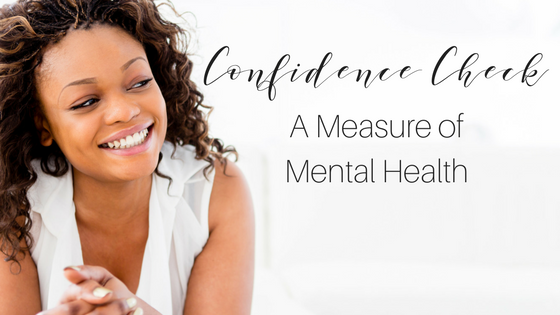Of all the parts of self, confidence fluctuates the most. It is the most vulnerable to outside influence. Can your confidence level be a measure of mental health? How confident are you in going about your day to day tasks? Consider these scenarios,
Do you speak to people as you pass them at in halls at school, work, the gym, or grocery store, or do you shrink a bit and hope to not be seen?
Do you share your ideas with others, or do you believe that your ideas are not important enough to share?
Are you able to accept a compliment at face value or do you question the motives of the person giving you the compliment?
When you get out of the shower in the morning and get a glimpse of yourself in the mirror, are the thoughts you think positive or negative?
Do you believe you deserve to be where you are? Is that a good job you earned it, or are you not where you should or want to be?
Think about how you responded to those scenarios. If you doubt yourself, question your worthiness or think the worst about yourself and others that may be an indication of a deeper problem. Confidence can be greatly influenced by mental health issues. Anxiety, depression, bipolar, substance abuse, and many other mental health disorders have the symptom of low self-worth. Low self-worth leads to a lack of confidence. If you do not believe you are worthy, then it will influence your actions. Authentic confidence and not pride stems from a person who is mentally healthy. You can never achieve true confidence if you do not deal with the underlying negative beliefs that attach to your self-worth. Let’s think about it a little deeper. Take the top two most common mental health issues, anxiety, and depression. One of the symptoms in both of these issues is low-self-esteem.
Confidence and Anxiety
Anxiety is characterized by unrealistic fears, excessive worry, feeling like you are going crazy, inability to sleep, feelings of dread or doom. Those thoughts then cause physical symptoms of shortness of breath, upset stomach, racing heart, sweating, chest pain, headaches, and numbness. But what has triggered your mind to go off to the races with such extreme thoughts. Often it comes from the negative, unrealistic, or distorted beliefs we hold about ourselves. How can you be truly confident when you think negatively about yourself. You can not convince others of anything if you don’t believe it yourself. Why should someone listen to you if you don’t believe you are sharing something worth listening to.
An example of how this works.
You hold the belief that you are stupid. Now you are afraid to speak in public due to fears of sounding dumb. You are afraid to speak with people because you may say the wrong thing and sound foolish. When you have to work in groups at school or work or have to speak in public or meet new people, social situation, you are afraid, begin to sweat, shake, get nervous, your body reacts because you perceive those situations as a threat. Now you in a full blown anxiety or panic attack. The belief, trigger the negative thoughts, the negative thoughts trigger the fear, the fear triggered the physical reaction.
Confidence and Depression
Symptoms of depression include difficulties sleeping or too much sleep, uncontrollable negative thoughts, low self-esteem, irritability, anger, aggression, helplessness, hopelessness. Depression is rooted in a poor self-worth and persistent negative thinking. When negative thinking dominates your thoughts and goes unchecked it turns into depression. Which then manifest in behaviors and physical symptoms like the inability to sleep or fatigue, loss of appetite, or increase in appetite, weight gain or weight loss. When you are feeling down on yourself if is difficult for you to confidently live your life. You are so focused on the bad, you are blinded to the good. With depression, the negative thinking is so debilitating that you do not even try. There is zero confidence.
When your confidence begins to decrease, consider what is draining your confidence. Identify the negative thought, and belief. Consider the context in which that belief was formed. It is time to do the work to heal that wound. Have you processed that issue? What internal skills can you use to increase confidence? What other resources can you use to help boost your confidence? Authentic Confidence comes from a place of wholeness. Do what it takes to recover. Get control over the negative thinking before it turns into a mental health disorder like anxiety or depression.
Inspiration in your inbox!
Need a little pick me up from time to time. Sign up for the newsletter designed to provide words of encouragement to boost self-esteem.

